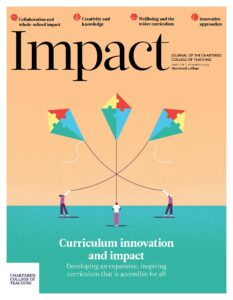Nurturing epistemic agency through interdisciplinary enquiry
Written by: Caroline Thomas and Lee Hazeldine

9 min read
DR CAROLINE THOMAS AND DR LEE HAZELDINE, SENIOR LECTURERS IN EDUCATION, RESEARCHERS IN EPISTEMIC INSIGHT IN INITIAL TEACHER EDUCATION, CANTERBURY CHRIST CHURCH UNIVERSITY, UK
The OECD considers the development of epistemic knowledge an imperative for the 21st century (OECD, 2018, 2021). Epistemic knowledge describes what student-teachers and their pupils learn about the methods, processes and norms of thought related to distinct disciplines. Epistemic knowledge enables student-teachers and their pupils to think and act like scholars; they become effective epistemic agents. It provides relevance and purpose to their learning and develops ‘disciplinary knowledge’ (Ofsted, 2021). The Epistemic Insight (EI) initiative at Canterbury Christ Church University allows student-teachers to create pedagogies for developing pupils’ epistemic insight and agency in schools (Billingsley, Nassaji et al., 2018).
Three case studies illustrate how student-teachers become research-active practiti
Join us or sign in now to view the rest of this page
You're viewing this site as a guest, which only allows you to view a limited amount of content.
To view this page and get access to all our resources, join the Chartered College of Teaching (it's free for trainee teachers and half price for NQTs) or log in if you're already a member.
- Billingsley B et al. (2020) Essential Experiences in Science. Canterbury Christ Church University. Available at: https://www.epistemicinsight.com/ees-2/ (accessed 19 April 2023).
- Billingsley B, Nassaji M, Fraser S et al. (2018) A framework for teaching epistemic insight in schools. Research in Science Education 48: 1115–1132.
- Ofsted (2021) Curriculum research reviews. Available at: www.gov.uk/government/collections/curriculum-research-reviews (accessed 10 July 2021).
- Organisation for Economic Co-operation and Development (OECD) (2018) OECD future of education and skills 2030: The future we want. Available at: www.oecd.org/education/2030/E2030%20Position%20Paper%20(05.04.2018).pdf (accessed23 March 2023).
- Organisation for Economic Co-operation and Development (OECD) (2021) Embedding values and attitudes in the curriculum: Shaping a better future. Available at: www.oecd-ilibrary.org/education/embedding-values-and-attitudes-in-curriculum_aee2adcd-en (accessed 3 February 2022).
- Organisation for Economic Co-operation and Development (OECD) (2022) OECD future of education and skills 2030: The OECD learning compass 2030. Available at: www.oecd.org/education/2030-project/teaching-and-learning/learning (accessed 15 July 2022).
0
0
votes
Please Rate this content
Subscribe
Please login to comment
0 Comments
Inline Feedbacks
View all comments










